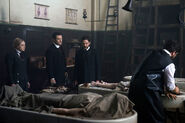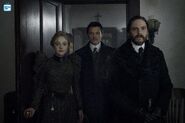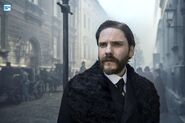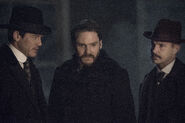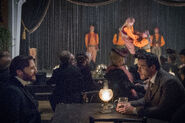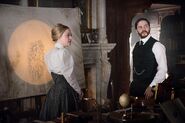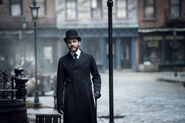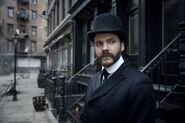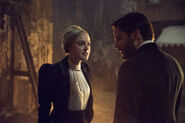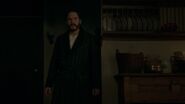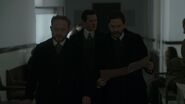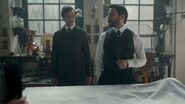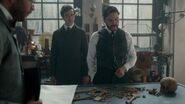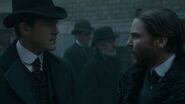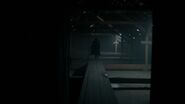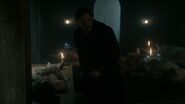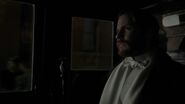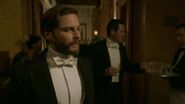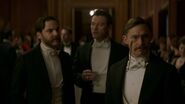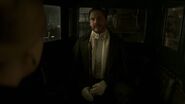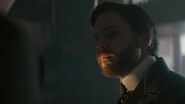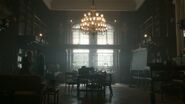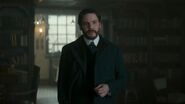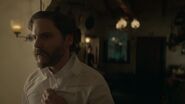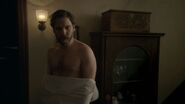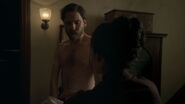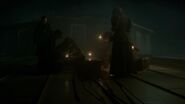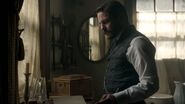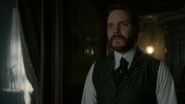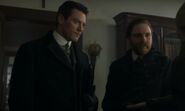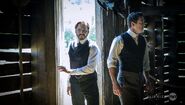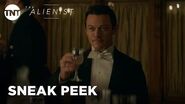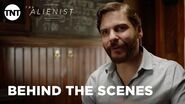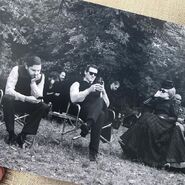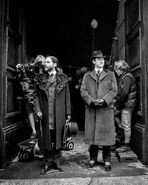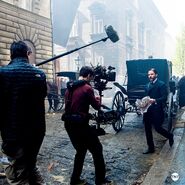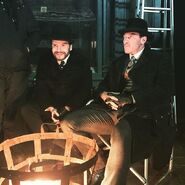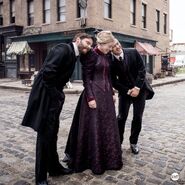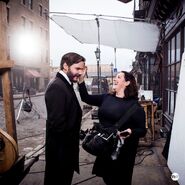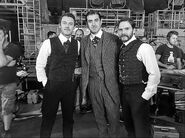
|
Work in progress!
This article is currently Under Construction. Therefore, please excuse its informal appearance while it's being worked on. We hope to have it completed as soon as possible. |
| “ | I am an alienist. I look to help those with an illness of the mind. I must construct an image of the killer. And, thereby, capture him. | ” |
| — Dr. Kreizler in "Define Alienist" teaser | ||
Dr. Laszlo Kreizler is an alienist, or criminal psychologist called upon by Theodore Roosevelt to investigate some mysterious murders in 1896 New York City.
He's the title character portrayed by Daniel Brühl.
Character Overview
"DR. LASZLO KREIZLER is known as an Alienist – one who studies mental pathologies and the deviant behaviors of those who are alienated from themselves and society. In addition to providing expert testimony in court that determines whether a person goes to prison, a mental hospital, or back on the streets, he operates the Kreizler Institute, providing a haven for “damaged” children. His alienist profession, along with his obsessive intensity and controversial views, makes him a social pariah in some circles. Kreizler is passionate and tireless in his efforts to seek out the depraved killer whose vicious, barbaric and ritualistic deeds have terrorized the children of the city's immigrant poor. In doing so, he hopes to also unravel the mysteries of the human psyche and answer the question: what motivates someone to become a serial killer?" [1]
Appearance and Personality
Dr. Laszlo Kreizler is a handsome man of medium height with brown hair, a thick beard that highlights the facial features and piercing dark brown eyes. He suffered a disability in the right arm that made it less strong and developed than the other limb, preventing him from performing normal functions, often causing a sense of frustration and discomfort in Laszlo.
Dr. Laszlo Kreizler is one of the luminaries of his time, ostracized by his medical colleagues and distinguished members of society for his avant-garde ideas and his unorthodox methods in the treatment of the afflictions of the mind, body, and spirit. His shrewdness and profound knowledge of the human psyche often place him in conditions of open conflict with those around him, since Kreizler seems to enjoy putting people in front of their demons. The alienist also lacks some social skills required to his social class, namely a hypocritical semblance of morals and ethics. On the other hand, Kreizler is endowed with a great spirit of observation and is free from prejudice against the outcasts and those oppressed by society. He is also very persuasive and does not hesitate to manipulate people to achieve his goals. Perfectly aware of his disability, he is strongly motivated to show his worth, rejecting any form of commiseration or pity for his condition.
Story
New York City, 1896. Dr. Kreizler awoke with a start in the middle of the night, quickly wearing his robe to respond to his housekeeper's incessant knocking on the bedroom's door. Once downstairs, Dr. Kreizler found himself in the presence of a child in an evident state of shock, looked after by the butler and the coachman, who had found him nearby the Williamsburg Bridge, saying that "something bad happened." The alienist sat in front of the child, trying to reassure him and then let him reveal what had happened. The child looked up at the doctor, wondering why the dead kid was wearing a dress, leaving the doctor stunned by such a question, eager to know more. Kreizler promptly instructed Stevie, the coachman, to fetch Mr. Moore and lead him to the crime scene at the Williamsburgh Bridge, reminding the boy to tell him to bring his drawing kit to catch the details.
Waiting for news, Dr. Kreizler reviewed some old cases in the dim light of his own room, sadly looking some photographs of a couple of children, whose names "Benjamin" and "Sofia" were written on the paper.
The following morning, Dr. Kreizler received a visit from a couple of parents in his office at the Kreizler Institute. The couple was concerned about their young son, Ezra, wondering if Dr. Kreizler would be able to cure him. According to his parents' statements, Ezra was an arsonist who suffered from nocturnal enuresis, and his parents pondered the possibility of a cure before their child set them on fire. Sitting with his legs crossed, Dr. Kreizler calmly replied that, as an alienist, he studied and treated the illness of the mind as well as emotional disorders, finding children's mind more fascinating than adult's. However, he did not boast the presumption of "curing" his patients. He only tries to alleviate their condition.
Shortly after, Dr. Kreizler went on to show Ezra the recreational areas of the Institute, such as the music hall and the playroom while children in blue uniforms and nurses roamed the corridors.
After completing his duties with the pupils of the institute, Dr. Kreizler received his long-standing friend John Schuyler Moore in the office, pouring him a generous amount of cognac. After apologizing to Moore for using him to bypass the police obstruction at the crime scene, Laszlo asked to examine Moore's drawings, remaining disappointed by their futility, since Moore had failed to realistically depict the corpse of Giorgio Santorelli, idealizing the mutilated corpse on the crime scene as if it were a martyr saint in a Renaissance painting. He then proceeded with some intrusive questions, asking Moore to reveal him the creepiest details, needing to see what John saw. The alienist succeeded, but he soon became speechless as Moore asked him if he was going to question the suspect.
Headed to Bellevue Hospital, Dr. Kreizler and John Moore crossed the gates, roaming the corridors of the criminal asylum ward with heavy steps. There, Dr. Kreizler was greeted by Doctor, who handled him the file before directing him to the cell in which the suspect, Henry Wolff, was locked up. Dr. Kreizler was briefed by Dr. Fuller about the reasons Wolff had been indicted. After barbarously stabbing a friend of his named Edwin Band in a fight, the police officers believed that he, blinded by bloodlust, had also killed Giorgio Santorelli, "the Boy on the Bridge." Dr. Kreizler asked if anyone else had questioned Wolff, besides the police, but Dr. Fuller replied that someone had tried but Wolff almost ripped his eyes out.
Crossing a series of gates, Dr. Kreizler and John Moore found themselves in front of Henry Wolff's cage, who was repeatedly banging his forehead against the corner of the cell, causing himself deep wounds. Ignoring the cries of the other inmates, Dr. Kreizler asked Mr. Wolff what he hoped to achieve through similar "exercises." When Wolff approached the bars, revealing a face horribly disfigured by sores, the alienist replied that there was no cure for the advanced stage of syphilis. Dr. Kreizler investigated the reasons that led Wolff to kill his friend, Edwin, inquiring him to kill the boy too. Addressing the Paresis Hall, however, Wolff snorted, stating that he was not accustomed to "molly houses full of rich pansies." Following Wolff's sexual allusions to John Moore, Dr. Kreizler asked Mr. Wolff if Moore reminded him of his friend Edwin, triggering a crisis in the suspect, who shouted he would kill him again if he could. The alienist continued his inquiry, ordering the guard to open the cell to approach Henry Wolff, despite John's advise not to do it. Once there, he was able to make the suspect confess he had nothing to do with the murder of Giorgio Santorelli since Edwin Band's murder was a crime of passion. Upon leaving, Wolff asked Kreizler what will catch him first between the gallows or the pox, to which the alienist replied he was afraid that in the New York State it would be the electric chair. "Either way, his pain will be gone soon."
Kreizler and Moore then headed to the New York City Police Department, where they were assaulted by a horde of journalists under the scornful gaze of former Chief Thomas Byrnes, Captain Connor and other police officers still faithful to him, despite being retired.
Making their way into the crowded police station, Dr. Kreizler and Moore came to Police Commissioner Roosevelt's office, only to find themselves hindered by his secretary, Miss Howard. The woman's family was an old acquaintance of the Moore family. In spite of this, she had no intention of making favors or being overtaken in the workplace because she was a woman. She, in fact, repeatedly corrected John Moore who continued to refer to her as 'Sara' instead of 'Miss Howard,' much to Kreizler's amusement caused by the woman's temperament, especially when she made a sneaky remark on his own works. While Moore explained to Miss Howard how the three of them were long-standing friends since Harvard, the alienist took advantage of the moment to enter the commissioner's office, stating that a surprise effect was in order.
Dr. Kreizler skipped off the pleasantries, getting comfortable in the office while explaining to Roosevelt how the man accused of the Santorelli murder was the wrong man. Briefing Roosevelt of his interview with Wolff, he cut short the commissioner's formalism, stating that he had done everything according to his own authority. The alienist went on to expose his theory, highlighting the obvious differences between the two cases of murder but focusing attention on an unsolved case from three years earlier: the murder of Zweig twins, Benjamin and Sofia. Kreizler explained that the child was a patient of his, brought to the Institute by the Zweigs because the child wanted to wear his sister's dresses. Following their disappearance, the corpses were found in a rooftop water tank and Benjamin's disfigurements were very similar to those of Giorgio Santorelli. The conversation was briefly interrupted by Roosevelt sending Miss Howard out of the room after Moore suggested that the conversation was a little indelicate. Firm in his beliefs, although Roosevelt did not seem willing to give accept the alienist's conjectures, Kreizler left the office followed by Moore.
Once outside the police station, John told his friend that he could be sublated like a blowtorch sometimes. The doctor did not give much importance to that statement, eager to know something more about Miss Howard and the possibility that she could help them get their hands on the Zweig murder's file.
Afterwards, Laszlo went to the rooftop water tank where the Zweig twins bodies had been found years before, presumably looking for clues or inspiration, staring at the skyline.
In the evening, Laszlo was playing the piano together with his servants Mary, Cyrus, and Stevie n his sitting room when he received a visit from Moore, bringing the Zweig files that Miss Howard had "borrowed" for them. After a quick glance at the documents, the doctor said he was dissatisfied with the mediocre compilation of the files, deeming them to be of no help to their investigations. A disinterment was necessary.
On the following day, the doctor gave a quick check to the rotten corpses of the murdered twins – whose coffins had been brought to Kreizler Institute – before receiving the visit of no other than Mrs. Zweig, who came to accuse Kreizler of being responsible for the death of her children. Upon learning of the Santorelli murder, the woman accused the alienist of having caused Benjamin and Sofia's untimely death with his claims that Benjamin's inclination was nothing to worry about and that love and acceptance towards him were imperative. Dr. Kreizler stood firm in his convictions, explaining her the difference between Santorelli – who dressed as a woman because he was a prostitute – and Benjamin, wearing his sister's clothes to express his true nature. The woman remarked her accusations before leaving, leaving Dr. Kreizler with his guilt.
Afterwards, the alienist introduced John Moore to Detective Sergeants Marcus and Lucius Isaacson at the Kreizler Institute's laboratory, since Roosevelt did not trust the coroner's office to conduct an autopsy on the Zweig corpses. The doctor inquired at the bit on the Isaacson's' expertise and on their trustworthiness, opting for the brother's use of modern technology as a reason for their ostracism among the police officers. He was surprised to find out from Lucius that even being Jewish affected a lot.
Since the autopsy required quite some time, Laszlo thought to propose John to get an early dinner somewhere, mocking his friend's sensitivity to the sight of corpses and murders. Lazlo revealed that he admired John's inclination to represent the good that people want to believe in in everyone, adding he thought that was the reason why people like John more than him. The two were about of getting on a carriage when Laszlo found inside it a wrapping of paper containing scraps of human organs. Looking around for those who might have thrown the envelope into the carriage, Laszlo went in pursuit of a shady figure in the streets, reaching the attic of a disused building. Reached by Moore, Laszlo pointed to a hole in the ceiling as the escape of the mysterious individual, and then handling the envelope to his friend, asking him if he had seen the Santorelli boy's mouth since a severed tongue was inside the wrapped paper.
Later at night, Laszlo was home, helped by Mary to get into his pajamas and slippers, briefing the woman on how he planned to catch the murderer. [2]
Dr. Laszlo Kreizler visited one of the City's morgues, asking the mortician if there were many cases of poor children brutally murdered. Walking through the corpses on tables while the mortician provided to insert vents in the corpses' belly – igniting the gas produced by the dead like macabre candles – Dr. Kreizler expressed particular interest in corpses with explanted organs such as the viscera or the tongue, but the mortician replied mentioning Leviticus, Deuteronomy and the lack of religious signs on Kreizler's clothes, accusing the alienist to be nothing more than yet another scientist playing God. Kreizler stood firm in his requests denying such accusations, whereupon the mortician said that if he searched for information on the "boy-whore from the bridge", it was his opinion that the boy had it coming.
Some time later, Keizler visited a teenage girl named Berthe in his office at the Kreizler Institute, while Mrs. Rajk desperately explained how her daughter touched herself every night and that the priest had recommended ice baths and leeches to ward off the devils inside her. Kreizler was shocked by the unnecessary and harmful treatments, stating that there was nothing wrong with the girl's mind, who was about to become a young woman and that there was nothing that parents or priests could do about it. Outside the study, Mrs. Rajk was scolded by her husband in Hungarian, stating that their daughter needed God, not the doctor and the family priest – also speaking Hungarian – accused Kreisler's science of interfering with God's will. Kreizler replied that "Whoever does not love, does not know God because God is love." Giving proof of knowing both Hungarian and Holy Scriptures, Kreizler scoffed at the priest's insinuations, claiming to have found more questions than answers in the Bible and asking the priest why God allowed feeling both pleasure and pain just to punish young girls like Berthe for experiencing their bodies. Kreizler made it clear that his institute was a "sanctuary for the young", and advised the priest to remove himself from the premises before going back to his duties.
Afterwards, Kreizler was briefed by Miss Howard about two other children murdered while the two of them and John Moore were in the parlor of Kreizler's house. Kreizler asked for details about the murders, which Miss Howard promptly provided. While the identity of the "Negro boy" [3] was unknown, the other victim was named Aaron Morton. Moore stepped into the conversation, having found a brief mention of him in The Herald. According to his research, the victim worked at a brothel called Shang Draper's and was killed in a similar manner to the Santorelli boy and his body hidden on the Brooklyn Bridge. Walking around the room, Kreizler said it was imperative to examine the bodies, but Miss Howard said this was impossible; the Negro Morgue on Bleecker burned all the bodies left unclaimed and since Moore had not been able to track down some of Aaron Morton's family, he assumed he was buried in Potter's Field, a mass grave. Miss Howard, moreover, added that she had found the files by chance since they had been secreted. Kreizler congratulated Miss Howard, saying that her collaboration had been invaluable and then asked if Commissioner Roosevelt knew about it. To the woman's negative response to Roosevelt's involvement, Kreizler invited Miss Howard to spend the evening together. The conversation was interrupted by the noise of shattered porcelains; the housekeeper Mary Palmer, in fact, had inadvertently dropped a teacup and was promptly helped by Miss Howard to clean. The trio resumed their macabre conversation about the murders, with Kreizler interested in what Sara and John discovered from visiting the Santorelli family. The alienist was particularly interested in what was meant by Giorgio being different from the other boys, and if he was regularly beaten by his father.
On the evening of that same day, Kreizler and Moore went to the Opera House, taking advantage of their strategic position to comment on New York high society. Spying Roosevelt with his binoculars, Kreizler and Moore gossiped about how Mayor Strong had aged and J.P. Morgan, accompanied by a young woman claiming to be his niece. Kreizler was moved by sympathy towards his old friend Roosevelt, claiming that he despised the opera as much as Moore did. During the interlude, Kreizler refused champagne, allowing Moore to drink for both of them, headed towards Mayor Strong and Roosevelt.
Shortly thereafter, while Roosevelt absent-mindedly greeted other guests, Kreizler said he needed something from him. Because the examinations on the Zweig twins revealed serrations on the malar bone and supraorbital ridge of both eyes, it was a proof that someone had plucked their eyes out with a knife. Therefore, he needed to examine Santorelli's body since the coroner could take months, if ever. Kreizler disdainfully commented on the poor work done by the police officers during the investigation, suggesting the Isaacson brothers to perform the autopsy, having proved themselves to be more than capable in their job. Suggesting to carry on a parallel investigation, Kreizler further suggested a liaison between him and Roosevelt. That being Sara Howard, for she could easily pass unnoticed at the police station.
At Delmonico's, Kreizler entered the room that Charlie Delmonico had carefully set up for the alienist guests, greeting Miss Howard, Marcus, and Lucius Isaacson, apologizing for his and Moore's lateness arrival. The guests took their seats at the table, and Kreizler proposed a toast at the beginning of a fruitful partnership. While dinner began with a terrapin soup au clair, one of the specialties of the house, Kreizler let the Isaacsons explain their recent discoveries, clarifying the reason for their meeting. Marcus and Lucius gave evidence of recent modern investigative methods such as the study of finger-marks, showing the rest of the group a timepiece bearing a bloody finger-mark, found in the burial suit of Benjamin Zweig. They also showed an Arkansas Toothpick, stating almost certainly that the murder weapon was the same kind of dagger. Kreizler congratulated the detectives and then advised the rest of the ensemble that they were hunting down a ruthless murderer. Their job was to reconstruct the killer's identity and habits, paying attention to the murderer's obsession with violence because, if they got too close, that same violence could spill over onto them.
After dinner, Kreizler and Moore had an altercation on whether to put Sara at risk because Moore was convinced that Sara wasn't as strong as she wanted them to believe. Kreizler advised his friend not to let his affection for Miss Howard to affect his logic because according to him, Miss Howard was a resourceful member of the team.
Outside the Delmonico's, Kreizler offered a ride to Moore, but he refused, leaving Sara and Laszlo alone in the carriage. The woman scolded Kreizler, telling him that he had to insist more on giving Moore a ride home because he was not as strong as he wanted others to believe. This made the alienist smile because both Sara and John had said the same thing about each other but nonetheless told Stevie to follow Moore, leaving Cyrus to drive the carriage. Reconnecting to the young woman's speech, Kreizler affirmed that sometimes our weaknesses serve us far more than our strengths, adding that he was metaphorically speaking when Miss Howard expressed surprise that Kreizler had admitted that he had weaknesses. Kreizler proceeded, then, to ask if she wanted to help them in investigations, being impressed by her determination to succeed in a man's world. Miss Howard agreed. Once reached Howard's house, the two took their leave. [4]
808-Broadway. Dr. Kreizler and Miss Howard took care of John Moore's hangover while Lucius and Marcus Isaacson set up equipment in their new headquarters, an apartment away from the prying eyes of the police. After John recovered slightly from the bewilderment, Laszlo asked him about his whereabouts of the previous night since Stevie had found him wandering in the dark alleys of Tenderloin after spending the night at the Paresis Hall. John tried to recall his meeting with Sally, causing a slight misunderstanding among his colleagues about the nature of such an encounter. Kreizler did not pay much attention to this, as he was more interested in finding out more about Giorgio Santorelli, but Moore left the room, annoyed before Laszlo could ask further questions.
Later, Laszlo and the Isaacson brothers were studying the projections of the fingerprint found on the timepiece from Benjamin Zweig's burial suit, and the alienist noticed a distinctive mark that made him think it was a scar rather than a smear caused by a partial imprint as previously believed by Lucius. He, therefore, suggested that the sergeants perform an accurate analysis of Santorelli's corpse at the morgue.
At the Kreizler Institute, Laszlo received a visit from Sara Howard informing him of the disappearance of Giorgio Santorelli's body. Miss Howard thought this was an attempt by some corrupt police officers to cover up the murder, to which Kreizler agreed. Miss Howard told him that she was able to convince Commissioner Roosevelt to trust Kreizler more than his own men, and Laszlo replied that the unwillingness to pursue the killer on the part of the police only highlighted Mr. Roosevelt's isolation within the police department stating, moreover, that the new approaches of investigation or research were always initially received with diffidence by the majority. Miss Howard replied that, in her opinion, solitude suited Kreizler very well and the alienist changed the subject after a smile, clearly uncomfortable. Commenting on Miss Howard's clothes which suggested social engagement, Kreizler tried to psychoanalyze Miss Howard's desire to pursue the killer, wondering whether she required answers or she just wanted to keep the world at bay. The two then took their leave.
Later that evening, Laszlo was reading comfortably seated in an armchair by the fireplace when he received an unexpected visit from John Moore, who had recalled further details of his conversation with Sally. The young prostitute had revealed that Giorgio had flown out of a window with a man with a silver smile. Kreizler was rather skeptical and eager to speak directly to Sally.
The two friends ventured into the nocturnal streets of Tenderloin, where they found Sally on a sidewalk. After convincing her that they had no intention to harm her, they moved into a dark alley where Kreizler managed to talk to Sally. Kreizler asked Sally why she was working in the street that night instead of at Paresis Hall, and the boy replied that at the brothel they had to pay most of what they earn to Biff and Kelly in exchange for protection from rough stuff. Kreizler wondered if customers always required them to dress like a girl, receiving in response that "they do things real girls don't do." He also discovered that the young prostitutes knew how to discern between dangerous and trusted clients, coming to realize that the murderer they were pursuing earned the trust of his victims in order to abduct and kill them undisturbed. Paid Sally for her time and information, Kreizler expressed his theory to Moore before taking his leave.
Back at home, Kreizler was studying some books sitting at a desk covered with books, documentation, and journals when he decided to have a conversation with Cyrus Montrose, his faithful servant. Cyrus was disturbed by a photograph of the butchered corpse of Mary Jane Kelly – alleged last victim of Jack The Ripper – prompting Kreizler to ask Cyrus's opinion about the case, since there was nothing in his books able to offer him an insight into what means to take another life. Kreizler asked Cyrus if he remembered what he said when he testified at Cyrus's trial on how witnessing a woman beaten had brought back memories of how Cyrus's own mother was killed, triggering in him a homicide impulse to kill that woman's assailants. Cyrus told the alienist that he remembered every word and would have agreed with any theory Kreizler would've had in order not to be hanged. The servant advised Kreizler not to get lost in conjectures on why there is murder, as this would only result in driving him mad. But Kreizler was eager to find an answer, spurring Cyrus in revealing the feelings he had felt in the killing. Kreizler then noticed that he had stained the shirt cuff with ink and headed for the kitchen with the intention of removing the stain. Unable to clean it, he tried to unbutton his shirt after taking off jacket and vest, finding the action extremely difficult since he had to do everything with one hand. Housekeeper Mary entered the room, telling him with gestures that she wanted to help him clean the shirt. The two exchanged glances as Laszlo stood bare-chested in front of the maid, revealing his crippled right arm. Their intimate moment was interrupted by Stevie, bursting into the kitchen to warn the doctor that another murder had been committed.
Arriving immediately at the crime scene – the roof of the former immigration station, close to reopening as a city aquarium – Kreizler and the Isaacson brothers were able to study the area of the crime before the arrival of the police thanks to the intervention of Roosevelt, who had managed to delay the investigation by keeping Captain Connor unaware of the recent murder. While the sergeants were photographing the body and expressing a summary analysis, Kreizler briefed Moore and Miss Howard, arrived last on the crime scene. The woman, after an initial dizziness caused by the sight of the butchered body, theorized that the murderer was drawn to the heights and the water could be a common denominator because both of these elements were present in all the murders committed up to that point. Kreizler welcomed Howard's theories with excitement, but Cyrus warned them of the arrival of the police. Initially, Kreizler did not care, ordering Marcus and Lucius to continue with their work. Cornered, the team had to flee before being discovered by the police and journalists who were increasingly crowded around the building, making it impossible for Roosevelt to hold them over.
Kreizler, Moore, and Howard were arguing about their investigation as they returned to the headquarters and the alienist scolded Mary for preparing breakfast, stating that he had not given instructions for her to come there. Lazlo was very strict with Mary, sending her away while Moore and Sara remained silent to assist. Before Mary left the building, Moore thanked her. Moore, then, insisted on going home to sleep having been up all night, but Kreizler argued that they had to persevere in the investigation when the impressions were still fresh. Kreizler started to wonder if the terror of children was essential to the killer, sparking a fight with both Moore and Howard, who were exhausted by his constant tactless affirmations. Kreizler, in fact, had pushed both to reflect on their respective traumas: the loss of the brother, father's disapproval and the breakup of the engagement that had driven Moore to alcoholism and promiscuous sex with prostitutes, and asking Miss Howard what was her opiate to cope with her father's suicide. Both left the building deeply troubled and angry, leaving Kreizler alone with his guesswork after he asked them to leave and come back only after they were able to look inside themselves.
Back home, Kreizler went into the kitchen probably to make sure that Mary was okay but when the woman ignored him, turning his back on him as she washed the dishes, Kreizler left. [5]
Dr. Kreizler paid a visit to Mrs. Williams, a former patient of his in order to recollect information on what could drive a man to seek pleasure in the murder. After a man dressed as a housemaid had served tea, Mrs. Williams told him that the man was a foreman at the brewery quite used to giving orders but at her house, he prefers taking them. Kreizler listened Mrs. Wiilliams telling him how she had passed the stage where she tortured hapless creatures. Since she seemed to be familiar with inflicting pain, Kreizler considered asking for her help to understand the motivations behind it. The woman showed him some butterflies on a frame, stating that beneath their beautiful wings is a whole array of instruments used to inflict agony during coitus. She went on, saying that the connection between pain and pleasure is far more common than Kreizler thought and that the mind is the most erotic organ of the body. The alienist asked for further examples given that he wasn't able to grasp the motivation, and Mrs. Williams explained to him that, in her experience, the man who enjoys defiling women is usually dominated in his daily life, while the man who is being beaten is probably a bully. She then made Kreizler uncomfortable when she affirmed that with all his intelligence, he was most likely aroused by someone for whom that intelligence means nothing. Kreizler, therefore, came to the conclusion that the murderer was attracted by his opposite but Mrs. Williams offered another point of view by asking the alienist which of all the stories she told him when she was his patient wormed their way into his mind. Kreizler revealed they were her accounts of men's vulnerabilities in particular interesting, in which he recognized his own weakness, aroused by them. Therefore, that meant that if the murdered enjoys inflicting wounds, there's a good chance he has wounds of his own. Kreizler promptly left the room when Mrs. Williams started to touch his right arm, whispering in his ear that "the cripple in him is looking for the cripple in another."
Afterwards, Kreizler went to the park for one of his "trances", deep reflections in which he rearranged his thoughts. There, he met Miss Howard, who was looking for him to deliver an envelope from Commissioner Roosevelt. Once opened, he discovered that it contained John Moore's drawing kit found at the crime scene by Captain Connor. Before Miss Howard could leave, Kreizler asked her if she had the time to think about what was said in their last conversation, adding that she could be surprised when she said she doesn't believe she had it in her to kill a child. The two sat down on a bench, and Kreizler showed Miss Howard a woman sitting across the park, pushing a perambulator. He told of how the woman belonged to a wealthy family and how this had prevented her from being interned or arrested after she had drowned both her children in a bathtub and, instead of proper treatment, she now walks the park daily, pushing an empty perambulator. Sara stated she wasn't able to feel empathy for her, but Kreizler replied that she surely understood the expectations that society bestows on women to marry, to have children, to smile when they feel incapable of smiling. Before leaving, Kreizler added that he believed everyone possesses the raw material required to commit horrible acts and that it's only the right or wrong combination of events to make the raw material combustible.
At Kreizler Institute, Kreizler conducted a psychological examination on Charles, a boy interned at Bellevue Hospital for his impulse in butchering dogs. Aimed to find out the reason behind it, Kreizler was unable to reach satisfactory conclusions and he later noted that Ezra Mills, one of the institute's wards, was kicking the wall in the recreation area. Helen, one of the nurses, attributed the recent restlessness in children to the full moon, but Kreizler disregarded such thing. After recovering a ball from the playground, Kreizler approached Ezra telling him that he was sorry that his parents had not visited him that week. Kreizler suggested to the child to play together, pretending that the ball was someone special. Ezra said he wants it to be his mother before starting to kick violently the ball shouting it was his mother. Once Ezra had vented his frustration against the ball, Kreizler complimented him and kicked the ball himself.
When he returned home, Laszlo looked for Mary when he was unable to unbutton his boots by himself, but she was not home. Laszlo went to her bedroom, flipping through some books containing dried flowers and sniffing her nightgown.
When Mary returned home accompanied by John Moore, Laszlo was very angry, telling the woman she had to tell him when she left. Mary ignored him, going to the kitchen and leaving Kreizler arguing with Moore. Kreizler returned John his drawing kit, commenting harshly John's carelessness. Kreizler asked John to help him unbutton his boots, ignoring John's assumption about Laszlo being jealous of Mary. The two argued again when Laszlo insisted on finding a similarity between the murderer and John's fixation in seeking comfort in drinking and prostitutes. Kreizler, therefore, remained alone when John left his home, exasperated by him.
The following day, Kreizler received a visit from Moore, who discovered that the silver smile of the murderer could be caused by syphilis. Kreizler agreed, stating that some cases of congenital syphilis can disfigure teeth, but that he never heard of it discoloring them. Moore stood firm in his beliefs, claiming to have talked to a dentist. Sufficiently convinced, Kreizler gave a chalk to John so he could write "silver smile" on the blackboard. Laszlo went on with his ramblings while moving the spheres of an astrolabe, saying that what they were missing wasn't how he kills, but why and most importantly, when will he kill again.
In the evening, Kreizler went to a cabaret at Moore's request, only to discover that Moore believed he had been invited by him. When both Marcus and Lucius Isaacson and Sara Howard showed up at the club, Kreizler realized that they had been invited there by the killer himself. Miss Howard showed the ensemble a letter that Mrs. Santorelli had received from the murderer. Kreizler read it and concluded that they had to become smarter since the killer was watching them and was several steps ahead of them. [6]
Memorable Quotes
- Dr. Keizler: "I work as a specialist in deviant behavior – an alienist. My profession makes me a bit of a social pariah. My aim is to unravel the traumatic mysteries of the human psyche and answer what makes a man into a murderer."
- — Kreizler's voiceover, Promotional teaser [7]
- Dr. Kreizler (to Ezra's parents): "As an alienist, I treat mental and emotional disorders in my patients, and I try to alleviate their condition. I do not presume to cure them."
- Dr. Kreizler: "I'm certain cold-blooded killers walk among us. They are out there now, hidden yet their motives are understandable, but this one is different. His acts are so wretched, so evil that only if I become him; If I cut the child's throat myself; If I run my knife through the helpless body and pluck innocent eyes from a horrified face... Only then will I come to truly understand what I am. Only then will I recognize that what drives me is not an absence of emotions at all. Rather, a torrent of feeling. The kind that gives meaning and purpose to my own blackened soul. I must see life as he sees it. Feel pain as he feels it. Take the same path he takes. Yes, I must follow this wherever it goes. Even if it leads me to the darkest pit of Hell."
- — The Boy on the Bridge
- Dr. Kreizler (to Rajk family's priest): "I, too, learned Scripture when I was young. But instead of answers, I found only questions. Why does God allow us to feel both pleasure and pain? Why has he given a young girl like Berthe impulses and desires she cannot begin to fathom or control? Is this the God of whom we speak?"
- Dr. Kreizler (about his Institute): "This is a sanctuary for the young. I will not tolerate its trespass, neither by man nor by God."
- Dr. Kreizler (to his associates): "We may not know his name or where he lives, but he exists in plain sight. Though evidence does not immediately reveal him, there are hints and indications of his identity that he's unwittingly left behind. Now, our task is to gather those hints and indications to construct an image of the man his age, his background, his habits, but most importantly, his appetites. Look at who his victims are, where he commits his crimes, and what exactly he does to them until a pattern begins to emerge."
- Dr. Kreizler (to his associates): "Each and every one of the choices he makes will reveal a hidden aspect of his alienated mind. And there's one more thing. We know the killer's conscious thoughts are fixed on violence. If we get too close, that violence might well spill over onto us."
- — A Fruitful Partnership
- Dr. Kreizler (to Howard and Moore): "Is the child's terror essential to the killer's experience? [...] Certainly, a beggar is motivated to steal a piece of bread because he's hungry. But why does our killer do what he does?"
- Dr. Kreizler (to Miss Howard): "This fixation on boys perhaps he's reliving a physical or emotional trauma. Miss Howard, how did you cope with your father's suicide? John indulges himself with drink. What do you do?"
- Dr. Kreizler (to John Moore): "Miss Howard, if she wants to be of aid here, must confront her feelings, because we all, in some manner, protect ourselves from psychological and emotional pain by taking action to craft fantasies of revenge, of power, of sexual gratification."
- Dr. Kreizler (to Mrs. Williams): "I recognized my own weakness, and it gave me pleasure."
- Dr. Kreizler (to Miss Howard): "You say you cannot see the world from the perspective of a child killer because you could never kill a child. I believe we all possess the raw material required to commit horrible acts. We just need the right or wrong combination of events to make the raw material combustible."
- John Moore: "We won't find him by dissecting our own minds."
- Dr. Kreizler: "Nor shall we find him by looking for men with silver smiles. Chasing clues will mean he's always a step ahead of us.We must see what's behind the clues."
- Dr. Kreizler (to his associates): "He's watching us."
Gallery
Episode scenes
Inside
Notes
- In an interview posted on the official Twitter account, Daniel Brühl gave an insight of his character:
"The character I'm playing is Dr. Laszlo Kreizler, who is a psychologist. They were called 'Alienists' back in the day. His approach is very new. He is clever enough to surround himself with people who have similar abilities and progressive minds in other fields which help him in finding the murderer." [8]
- The original, and slightly different draft for Dr.Laszlo Kreizler's description read as follow:
"Known as an alienist – one who studies mental pathologies – Dr. Kriezler works as a specialist in deviant behavior. His profession, along with his careless intensity, makes him a social pariah in some circles, despite his striking good looks and a sophisticated sensibility. Kreizler is passionate about his work and tireless in his efforts to seek out the depraved killer whose vicious, barbaric and ritualistic deeds have terrorized the city's poorest residents. In doing so, he hopes to also unravel the traumatic mysteries of the human psyche, especially his own, and answer the question behind what makes a man into a murderer." [9]
Episode Appearance
- Ep. 1: The Boy on the Bridge
- Ep. 2: A Fruitful Partnership
- Ep. 3: Silver Smile
- Ep. 4: These Bloody Thoughts
- Ep. 5: Hildebrandt’s Starling
References
- ↑ Official Overview for Daniel Brühl's Dr. Laszlo Kreizler — TNT Pressroom
- ↑ Hossein Amini (writer) & Jakob Verbruggen (director); (January 22, 2018); "The Boy on the Bridge". Episode 1. The Alienist. TNT
- ↑ Ethnic insult used in the original conversation, repeating the term used in the police reports.
- ↑ Hossein Amini & E. Max Frye (writers) & Jakob Verbruggen (director); (January 29, 2018); "A Fruitful Partnership". Episode 2.The Alienist. TNT
- ↑ Gina Gionfriddo (writer) & Jakob Verbruggen (director); (February 5, 2018); "Silver Smile". Episode 3.The Alienist. TNT
- ↑ Gina Gionfriddo & Cary Joji Fukunaga (writers) & James Hawes (director); (February 12, 2018); "These Bloody Thoughts". Episode 4.The Alienist. TNT
- ↑ ‘The Alienist’ promotional quote — @TheAlienistTNT on Instagram
- ↑ Daniel Brühl plays the title character on TNT drama brand new show, The Alienist.
- ↑ Alternate Overview for Daniel Brühl's Dr. Laszlo Kreizler — TNT Pressroom







